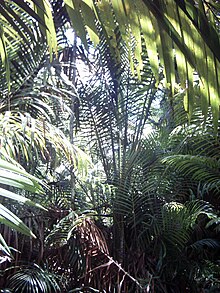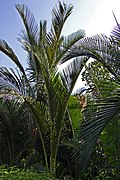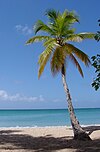Metroxylon
| Metroxylon | |
|---|---|

| |
| Metroxylon sagu | |
| Scientific classification | |
| Kingdom: | Plantae |
| Clade: | Tracheophytes |
| Clade: | Angiosperms |
| Clade: | Monocots |
| Clade: | Commelinids |
| Order: | Arecales |
| Family: | Arecaceae |
| Subfamily: | Calamoideae |
| Tribe: | Calameae |
| Genus: | Metroxylon Rottb.[1] |
| Species[2] | |
| Synonyms[3] | |
Metroxylon is a genus of monoecious flowering plants in the Arecaceae (palm) family, and commonly called the sago palms consisting of seven species. They are native to Western Samoa, New Guinea, the Solomon Islands, the Moluccas, the Carolines and Fiji in a variety of habitats, and cultivated westward to Thailand and Malaya.[3]
The name is a combination of two Greek words: metra meaning "womb", commonly translated as "heart" in this context, and xylon meaning "wood", in allusion to the large proportion of pith contained in the plant.
Description
The trunks of Metroxylon species are solitary or clumped and large to massive in size, and usually sprout aerial roots at leaf-scar rings. All but one is monocarpic (hapaxanthic), foliage is pinnate with oversized petioles and leaf sheaths. The petioles are distinguished by "groups of small black spines resembling the record made by a seismograph as it registers a mild tremor".[4] All species have spines on the rachis and petiole. The monocarpic species present a Christmas tree shaped inflorescence, or instead, upward-reaching branches spreading horizontally. These panicles are second only to Corypha spp in size, in the case of Metroxylon salomonense growing up to thirty feet (nine meters) in height by up to fifteen feet (4.5 meters) in width.[5] The fruit, covered in tough shiny scales arranged in precise rows, are relatively large for palms and contain one seed.[4]
Extant species
It contains the following species [6][7][3][2]
| Image | Name | Common name | Distribution |
|---|---|---|---|
 |
Metroxylon amicarum (H.Wendl.) Hook.f. | Caroline ivory-nut palm | Pohnpei, Chuuk |
| Metroxylon paulcoxii McClatchey | Samoa | ||
 |
Metroxylon sagu Rottb. | Sago palm | New Guinea, Maluku |
| Metroxylon salomonense (Warb.) Becc. | Solomon palm | New Guinea, Maluku, Solomon Islands, Santa Cruz Islands, Bismarck Archipelago, Vanuatu | |
| Metroxylon upoluense Becc. | Samoa | ||
 |
Metroxylon vitiense (H.Wendl.) Hook.f. | Fiji sago palm | Wallis and Futuna, Fiji |
 |
Metroxylon warburgii (Heimerl) Becc. | natangura palm[8] | Santa Cruz Islands, Samoa, Vanuatu |
References
- ^ Rottboell, Nye Samling af det Kongelige Danske Videnskabers Selskabs Skrifter 2:257. 1783 (conserved name) Type:M. sagu
- ^ a b The Plant List (2013). Version 1.1. Published on the Internet; http://www.theplantlist.org/tpl1.1/search?q=metroxylon (accessed 11 September 2017).
- ^ a b c Kew World Checklist of Selected Plant Families
- ^ a b Riffle, R. L. and Craft, P. (2003). An Encyclopedia of Cultivated Palms. Portland: Timber Press. ISBN 0-88192-558-6 / ISBN 978-0-88192-558-6 (page 389)
- ^ Corner, Prof. E.J.H. (1966). Natural History of Palms. Berkeley: University of California Press. pp. 316–317.
- ^ WCSP, World Checklist of Arecaceae: Metroxylon Archived 2007-08-08 at the Wayback Machine
- ^ "Metroxylon species (Sago palm)" (PDF).
- ^ Sentance, Bryan; Sentance, Polly (2009). "2 Central and South America". Craft Traditions of the World: Locally Made, Globally Inspiring. London, UK: Thames & Hudson. pp. 72–73. ISBN 9780500514665. OCLC 317919883.

